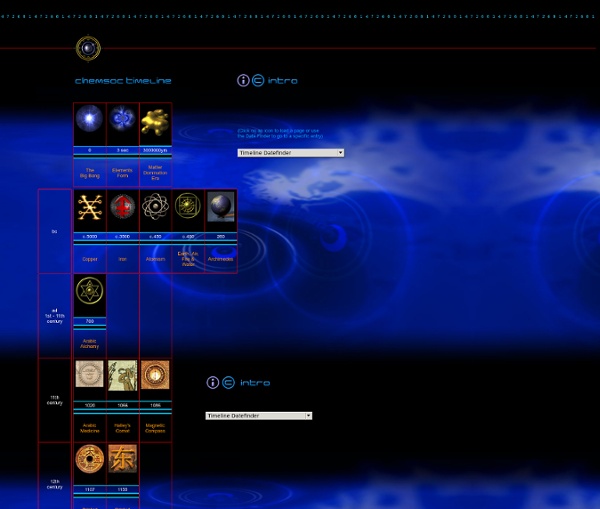Chemsoc timeline - flash
We would like to invite you to suggest other items for inclusion in the chemsoc timeline. All genuine suggestions will be considered and those accepted will be credited to the individual responsible! The events do not have to be chemistry related - just notable discoveries or incidences that are of interest to scientists and the general public. Please Email timeline@chemsoc.org with your suggestion, where possible please include the date the event/discovery took place and some basic details: where it took place, who was involved and maybe some other sources of information. You can even make predictions for inventions or discoveries that you think will be made in years to come. chemsoc's timeline artist Murray Robertson will create an an appropriate image to represent each successful entry. back to top
www.j-bradford-delong.net/Econ_Articles/Reviews/diamond_guns.html
This will start as a a normal sparring-match with Ricardo Duchesne (Mary 4) and then will be going to branch off into something perhaps far more interesting: >It is clear from my post >that I was using the term 'backwardness' within the context of WS >theory, which is not about the medieval world. Diamond draws a >rough line across the African continent to distinguish "white" Africa >from "black" Africa proper. Egyptians, Tunisians, Moroccans, >Libyans and others in the northern areas are "white" - in quotation >marks because he knows that this terminology is arbitrary and >ignores the diversity within. This dividing line still ignores Ethiopia - is it black, colored - what is it? What I find troubling about this argument "no - Africa does not include North Africa, does not include Madagascar etc." is this. For most of West Africa is not a primeval rain-forest region but a very densely settled peasant agricultural region. You get my point here, Ricardo?
List of experiments
From Wikipedia, the free encyclopedia The following is a list of historically important scientific experiments and observations demonstrating something of great scientific interest, typically in an elegant or clever manner. Astronomy[edit] Biology[edit] Chemistry[edit] Economics and political science[edit] Geology[edit] Charles Mason conducts an experiment near the Scottish mountain of Schiehallion that attempts to measure the mean density of the Earth for the first time. Physics[edit] Psychology[edit] See also[edit] Science portal
The Discovery of Argon
Carmen J. Giunta, Department of Chemistry, Le Moyne College, Syracuse, NY 13214 Presented at the 211th ACS National Meeting, New Orleans, LA, March 24, 1996. Abstract The history of science is full of stories which exhibit scientific methodology to an exemplary degree. Introduction and Outline Good morning. Pedagogical Background: Le Moyne College CHM 203, "Scientific Thought" Le Moyne College is a small, undergraduate-oriented institution with a Core curriculum founded on the liberal arts. The goal of the class is to teach non-science majors how scientists thin--and also some content if I'm lucky! Scripture says there is no new thing under the sun, and that is certainly true of the idea of using case histories to teach scientific method. Historical Background: The Discovery of Argon The case I'll speak about today, the discovery of argon, isn't quite so hoary or fundamental as such developments in chemistry as the oxygen theory of combustion, Dalton's atomic theory, or the periodic table.
Horrible Histories - Royal Society of Scientist
Horrible Histories Neil Armstrong
Horrible Histories - Titanic
Related:
Related:



